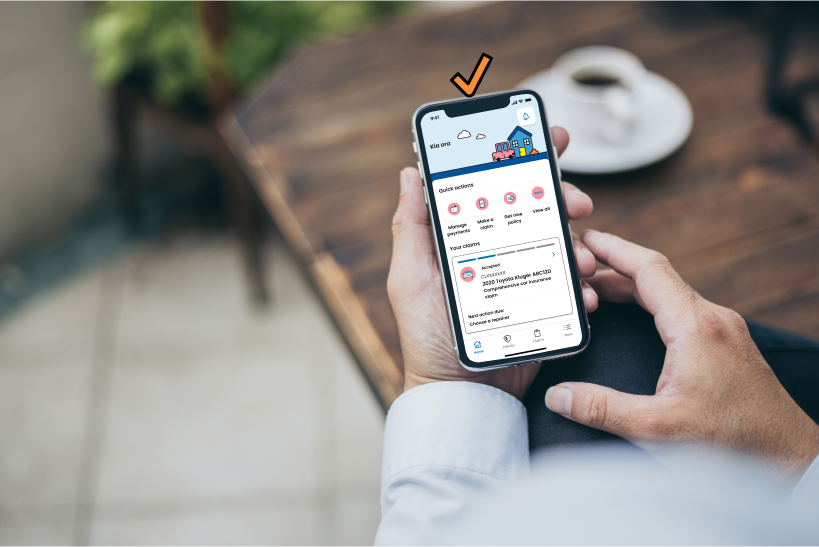While you’re busy thinking about whether your furniture will fit into your new home and what sort of cat door to get, you also need to consider home and contents insurance. It needs to be near the top of your ‘to do’ list, along with other essential tasks like organising settlement and getting utilities connected. If you’re hesitating, it could be because there are questions on your mind. Here we cover some of the most common questions about home and contents cover in New Zealand.
Should I get home and contents insurance?
The home you’ve just bought is probably your biggest investment ever, so it deserves to be protected by purpose-built insurance cover. If you’ve had to take out a loan in order to buy your home, your lender will likely require that you get a home insurance policy to cover the property.
How quickly can I get home insurance?
Getting home and/or contents cover organised can happen pretty quickly, once all the necessary information is provided, but don’t leave it to the last minute. As soon as you know you’re definitely going to buy a house (you’ve made an offer, it’s been accepted and you have finance all worked out), you should look to get the wheels moving on home cover.
First step will be to get a quote, then you’ll need to answer some questions about your new place, like:
- What is the likely cost to rebuild your home (i.e. what sum do you want to insure the home for)?
- Where is the house located?
- When was it built?
- How big is it?
- What is it made of?
- What condition is it in?
- What’s the section like (sloping, flat)?
- Are there any retaining walls?
- What else is on the property? (outbuildings, swimming pools etc)
If the house was built before 1935, needs urgent maintenance or has unrepaired damage, then the insurer may require some additional information.
How much should I insure my contents for?
This is one of those ‘how long is a piece of string’ questions. No two households are the same, because we all accumulate different things as we travel through life. An easy way to get an estimate of what your belongings are worth is to use a contents calculator. This tool will give you an estimated total value for your contents, which you can use to get a quote for contents cover.
Alternatively, you can walk from room to room in your home with a printed contents list. Remember to open every drawer and every cupboard, so that nothing gets missed. And don’t forget about stuff that lives in your garage or under the house.
Is it worth claiming on contents insurance?
When something you own is damaged, lost, or stolen, check your policy documents or call your contents insurer for guidance and clarification about the claims process. You can find out how much you can claim and whether any kind of excess applies. Your policy document contains all the information you need, so it’s a good idea to check it over before you call your insurer about claiming.
Do I need homeowner’s insurance if my house is paid for?
This is like asking ‘should I wear my seat belt if nobody’s watching?’. The answer is yes, absolutely. Insurance, like car seat belts, is about managing risk to minimise the effects of negative events. While paying off your home and discharging your mortgage means you’re under no obligation to a lender, an asset the size of a house should be protected against a multitude of unexpected events, such as: sudden and accidental damage, broken window glass and natural disasters - including earthquakes and floods. It is important to note that NHCover doesn’t apply if you’re uninsured. Home insurance also covers your personal liability, as a homeowner, for damage to another person’s property.
Home contents cover vs personal property?
In New Zealand, personal property insurance means home and contents insurance. Personal property cover and home and contents cover are different names for the same type of insurance.
Should I use a contents cover calculator?
You don’t have to, but it does make it easier to know the approximate total value of the things you own. If you don’t use a contents calculator, you can manually catalogue your possessions to keep track of them and record their value. Keeping a list like this could make claiming easier if a large amount of your possessions were stolen or damaged.
Because it’s likely you’ll be acquiring new things during the year, or even selling a few things, it’s a good idea to do a regular audit of your possessions and their value. This habit will ensure your contents cover reflects your actual possessions.
How much contents coverage do I need?
In a nutshell, you need enough cover to protect all the things you own. If you want to reduce the cost of your cover, you can select a higher excess or choose ‘average’ values for your things, instead of ‘above average’. And remember, if you’re flatting, your things will no longer be covered by your parents’ insurance. Independent life means having your own contents policy.
Some policies have limits on certain items, such as bicycles or cameras. These items may need to be specified on your policy to ensure they are adequately covered.
What is the benefit of a contents list for an insurance claim?
Using a contents list can help you to work out what might be missing after a burglary. However, if you’re looking for a contents list to help you determine the total value of your belongings, it may be better to use a contents calculator, which is an online tool that will provide you with an estimated value for your contents.
How does excess work on contents insurance?
An ‘excess’ is the amount you contribute towards a claim. For example, if you have an excess of $250 and your surfboard is stolen from the top of your car, you are required to contribute $250 towards your claim.
To reduce the cost of insurance, you can voluntarily increase the amount of your excess. A higher excess means a smaller premium, but it also means you have to pay more towards a claim. If the value of your loss is higher than any policy limit, you may still need to pay your excess in addition to any uninsured amount, unless your policy states that an excess will not apply.
You might also like...
-
 December 2024Insurance Blog | State Insurance
December 2024Insurance Blog | State InsuranceSwitch to email
-
 March 2024Insurance Blog | State Insurance
March 2024Insurance Blog | State InsuranceInsuring your electric vehicle with State: Navigating car insurance for EVs and hybrids
-
 March 2024Insurance Blog | State Insurance
March 2024Insurance Blog | State InsuranceThe ins and outs of Third Party Car Insurance
